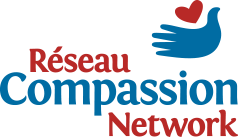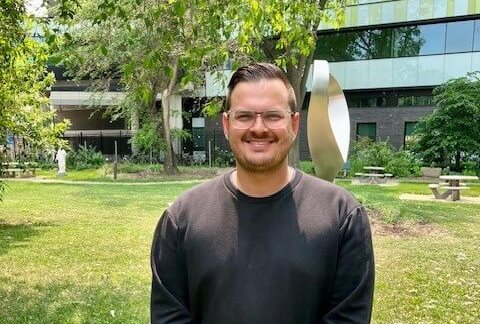Ryan Thomas began his role as Truth and Reconciliation Specialist at St. Boniface Hospital in May, 2023. This role, which was funded by the St. Boniface Hospital Foundation, is a new addition to the organisation. After four months on the job, Thomas spoke with Réseau Compassion Network (RCN) about why this role interested him, what he’s seeing so far and what he envisions for the future.
RCN: Before coming to St. Boniface Hospital, you were an Indigenous Community Response Specialist with the Canadian Red Cross supporting folks during times of natural disasters or other crises. What about this new Truth and Reconciliation role in a hospital setting caught your attention?
Ryan Thomas: Historically, Indigenous people have had a sub-standard access to quality health care. It’s a long history that includes residential schools, the creation of reserves, and living in isolated areas. When you’re coming out of a small community that you’re used to and comfortable with and you have to come to the city to get healthcare without supports, that’s hard. Health care providers need to understand the challenges these patients are facing.
You want a health care system to provide equal services to all. Everyone should be treated fairly. Your skin colour shouldn’t matter. That said, we do want to acknowledge the differences in culture. That’s what Canada represents, as a whole. It’s such a diverse country. You see diversity among our staff and patients. All different cultures are represented at St. B.
RCN: How will you and the team at St. Boniface Hospital start to make changes that take into account all that historical and cultural context?
RT: Firstly, I want to say that my colleagues are all really wonderful. I sense in them a sincere desire to make things better. So when I talk about making things better, I don’t want to minimise all the good that is happening already. Reconciliation is a journey that we’re all on together here in Manitoba and Canada, and it’s something that will continue for a long time to come.
When I started this role, I discovered that there were already monthly smudges in the Everett Atrium. We have an indoor smudge room that’s available to patients, as well. I was glad to see that, and glad that I wasn’t starting from scratch. Sometimes it’s hard to change things, I understand, but these were some great first steps.
One of the things we’re looking at is increasing Indigenous representation among staff, that’s an important way to increase reconciliation. We have a great relationship with Indigenous Health through the Winnipeg Regional Health Authority, and they’ve done a lot of work that we can continue to implement in the hospital around discharge planning, spiritual care and patient relations. There’s also some possibility of creating further ceremonial space on the grounds, perhaps something outdoors where we can have a sacred fire, for example.
RCN: Besides the willingness of staff to make changes to create safer spaces for Indigenous patients, what else is giving you hope these days?
RT: I’m happy to be permanently based in Winnipeg with my wife and three kids. In my role with the Red Cross, I was often away from home and that was really hard for all of us. Personally, this role is important, too. My father is from Nisichawayasihk Cree Nation (near Nelson House, Manitoba), and my mother is Ojibwe and Ukrainian. I learned about treaty rights and culture from a young age and now I get to help others better understand and better serve Indigenous people. I’m looking forward to the future.

